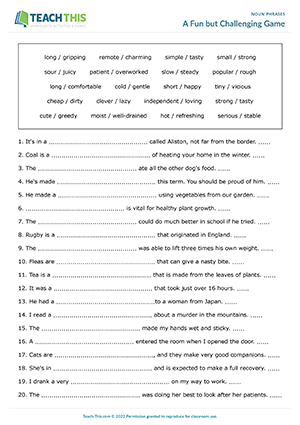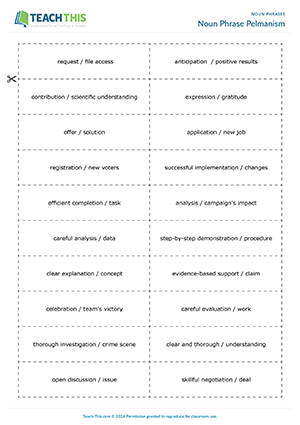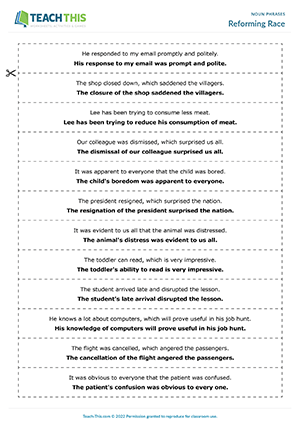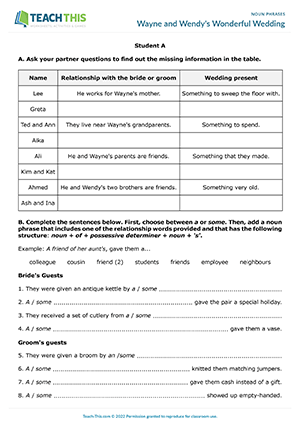In this engaging noun phrases game, students complete sentences by creating noun phrases with adjective pairs and but. Teams take turns picking up a noun card from the pile and placing it face-up on the table, e.g. town. That team then has one minute to choose a sentence where they think the noun belongs and form a noun phrase using one of the adjective pairs with but between the adjectives. The team then writes the noun phrase in the sentence, e.g. It's in a remote but charming town called Aliston...' Once a sentence has been completed, it's the other team's turn to play. If, after one minute, a team hasn't found a matching sentence and adjective pair, the other team can choose to use the noun or place it back at the bottom of the pile and pick up another card. The game continues until all the sentences have been completed. Afterwards, elicit the correct answers from the class. Teams score a point for each correct answer and subtract a point for each incorrect answer. The team with the most points wins the game.
In this productive noun phrases game, students match verb phrases to prompts from which they form noun phrases. In pairs, students take turns turning over one verb phrase card and one noun phrase prompt card. If the verb phrase matches the noun phrase prompt (e.g. 'She requested access to the files' and 'request/file access'), the student reads the verb phrase card aloud and then uses the prompt card to form a noun phrase, e.g. 'Her request for file access.' If the other student agrees that the noun phrase is correct and matches the verb phrase, the student keeps both cards and has another turn. If the two cards don't match, the student turns them back over, keeping them in the same place. There are 20 verb phrase and noun phrase pairs in total. The student with the most pairs of cards at the end of the game wins.
In this free noun phrases game, students practice changing verb phrases in sentences to noun phrases. In pairs, students take turns picking up a card and reading out the top sentence on the card to the other student, e.g. 'The little girl was obviously pleased to receive a new bicycle for Christmas.' The other student then tries to change the sentence by replacing the verb phrase with a noun phrase, retaining the original meaning, e.g. 'The little girl's pleasure at receiving a new bicycle for Christmas was obvious.' If the student successfully manages to say the sentence written at the bottom of the card or a similarly accurate sentence, they move their counter ahead one space diagonally. If the student is unable to form a correct sentence, they stay where they are. The two students then swap roles. The first student to reach the finish wins the game.
Here is a useful two-part noun phrases activity to help students practice noun phrases with possessive determiners. First, students ask their partner for information about guests at a wedding and complete a table with their answers. When the students have finished, they work alone and use the information from their table to complete sentences with noun phrases that match each guest to the wedding present they gave the bride and groom. Afterwards, check the correct answers with the class.
Latest Free
Resources
- Everyday Objects Bingo
Everyday Objects
Elementary (A1-A2)
- Action Verb Races
Actions
Elementary (A1-A2)
- Birthday Basics
Birthdays
Elementary (A1-A2)
- Sales Phrasal Verbs
Business Phrasal Verbs
Upper-intermediate (B2)
Latest Member
Resources
- Collocations at Work
Business Collocations
Intermediate (B1)
- Etiquette Trivia Board Game
Etiquette and Manners
Upper-intermediate (B2)
- Everyday Objects Vocabulary
Everyday Objects
Pre-intermediate (A2)
- Let's have a talk
Verb-Noun Collocations
Pre-intermediate (A2)







